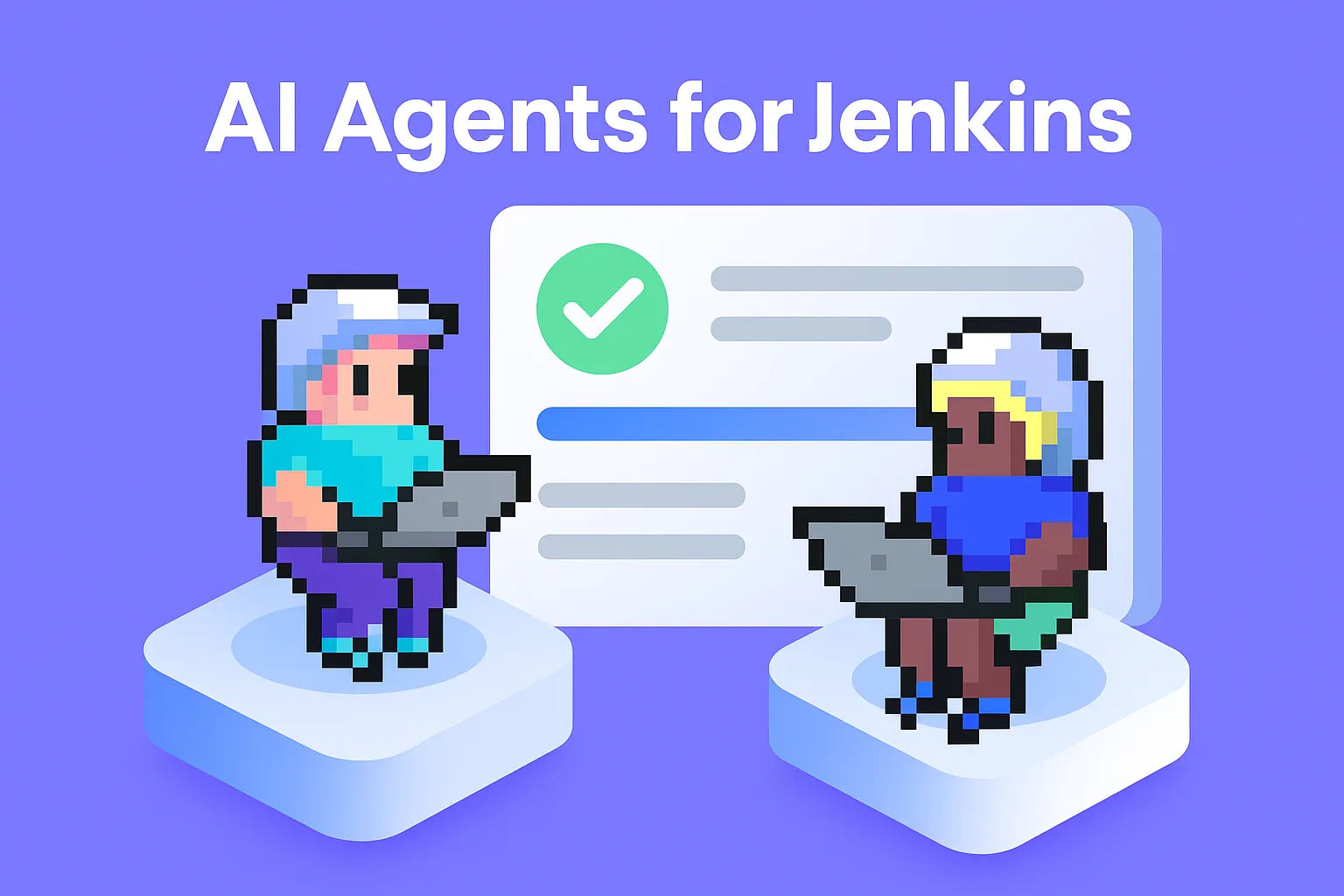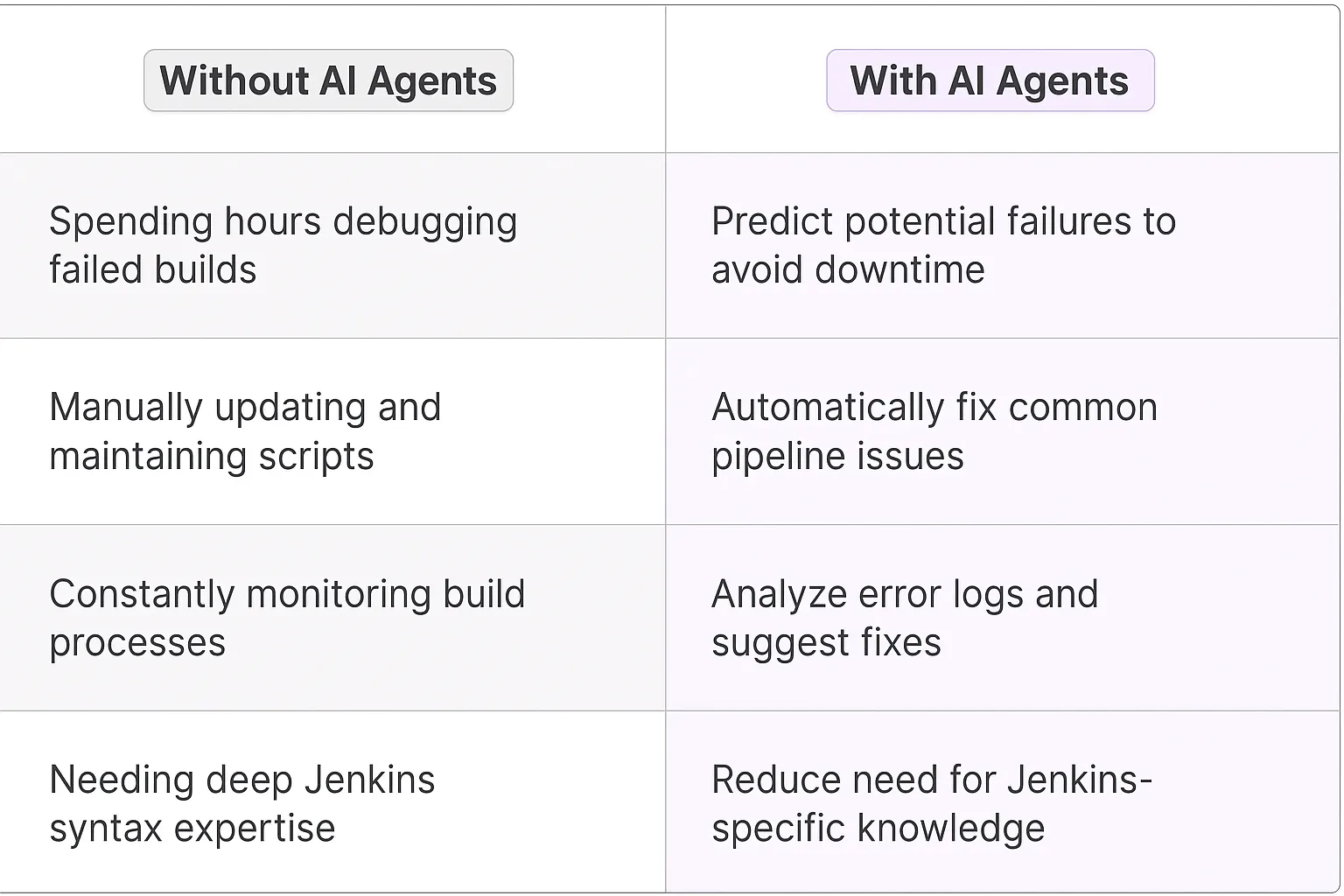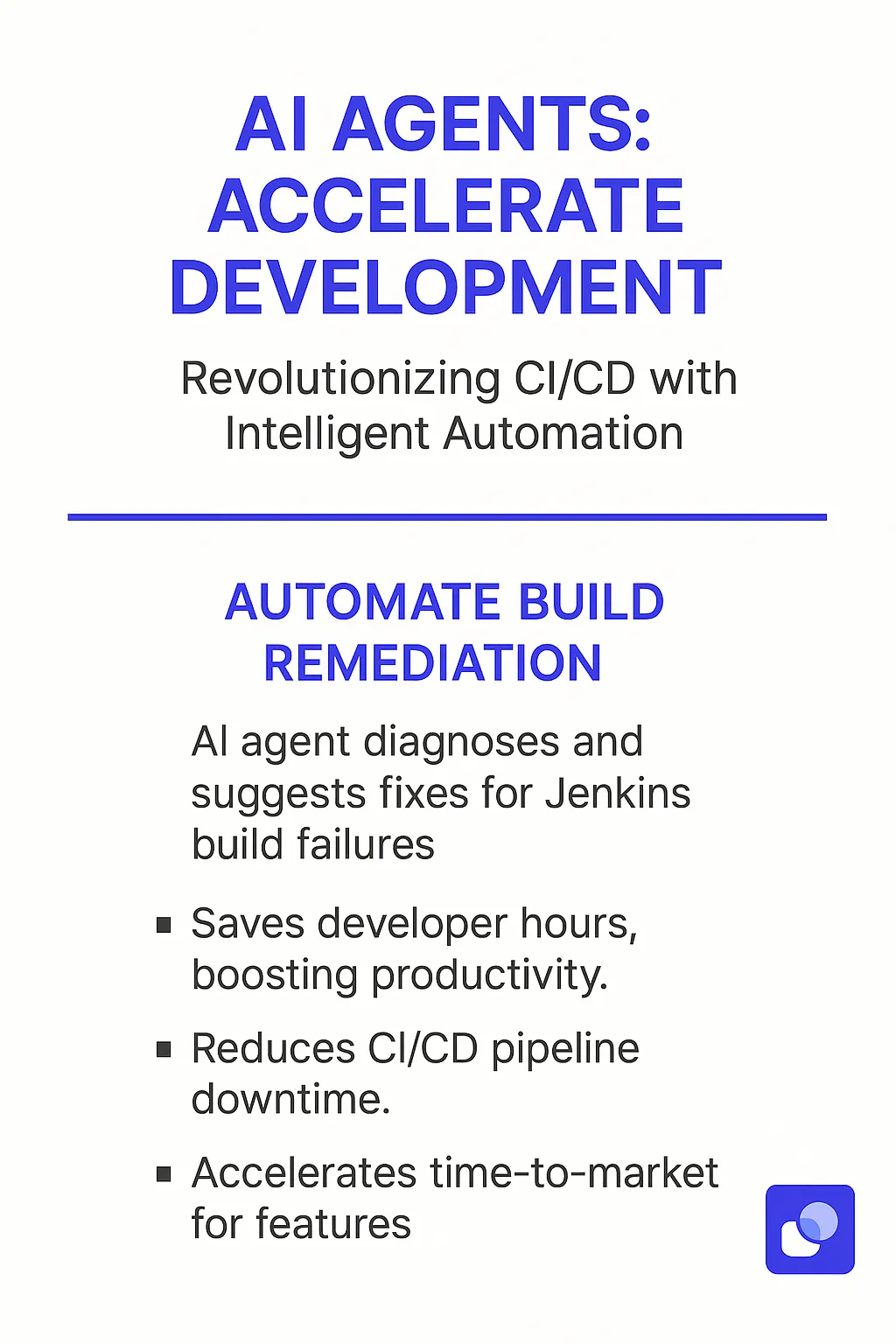Jenkins
Understanding Jenkins and AI Integration
Jenkins stands as the leading open-source automation server, powering millions of development workflows worldwide. At its core, Jenkins provides the backbone for continuous integration and continuous delivery (CI/CD), enabling teams to automate their build automation, test, and deployment processes. The platform's extensible architecture supports thousands of plugins, making it adaptable to virtually any development stack or toolchain.
Key Features of Jenkins
The platform excels in build automation with support for multiple SCM tools and build technologies. Its distributed architecture enables teams to spread build loads across multiple machines. Jenkins offers robust pipeline-as-code capabilities through Jenkinsfile, allowing teams to version control their automation workflows. The extensive plugin ecosystem provides integrations with nearly every development tool and cloud platform.

Benefits of AI Agents for Jenkins
What would have been used before AI Agents?
Traditional Jenkins workflows relied heavily on manual debugging, script maintenance, and configuration management. Development teams spent countless hours poring over build logs, updating pipeline configurations, and troubleshooting failed deployments. The process required deep expertise in Jenkins-specific syntax and constant monitoring of build processes.
What are the benefits of AI Agents?
AI Agents transform Jenkins operations through intelligent automation and predictive capabilities. These digital teammates analyze build patterns and identify potential failures before they occur, reducing downtime and accelerating deployment cycles.
The most significant advantage comes from their ability to automatically diagnose and fix common pipeline issues. When a build fails, AI Agents can instantly analyze error logs, compare them against historical data, and suggest specific fixes - a process that typically took engineers hours to complete manually.
Code quality improves as AI Agents review pipeline configurations in real-time, flagging potential security vulnerabilities and suggesting optimizations based on established best practices. They can even generate and maintain documentation for complex pipeline structures, keeping it current as systems evolve.
For large organizations running multiple Jenkins instances, AI Agents excel at identifying resource bottlenecks and suggesting load balancing improvements. They learn from successful builds across different projects, applying those insights to optimize performance across the entire CI/CD infrastructure.
The reduction in context-switching is particularly valuable - developers no longer need to jump between debugging sessions and feature development. AI Agents handle routine maintenance tasks, allowing teams to focus on strategic development work that drives business value.

Potential Use Cases of AI Agents with Jenkins
Processes
- Pipeline debugging and optimization - AI agents analyze build logs and performance metrics to identify bottlenecks and suggest specific improvements to Jenkins pipeline configurations
- Test suite management - Digital teammates monitor test coverage, identify flaky tests, and recommend test case prioritization based on historical failure patterns
- Resource allocation - AI-powered analysis of build resource usage patterns enables smart scaling of Jenkins agents and optimal job distribution
- Code quality monitoring - Automated analysis of static code analysis results with actionable recommendations for addressing technical debt
Tasks
- Build failure investigation - AI agents parse error logs, correlate issues across builds, and provide targeted debugging guidance to developers
- Security vulnerability scanning - Continuous monitoring of dependencies and build artifacts for security issues with contextual remediation steps
- Release notes generation - Automated compilation of changelog entries from commit messages and JIRA tickets with natural language summaries
- Infrastructure cost optimization - Analysis of build infrastructure usage patterns to identify opportunities for reducing cloud compute costs
- Configuration management - AI-driven suggestions for Jenkins configuration updates based on evolving project needs and industry best practices
- Build time prediction - Machine learning models estimate build completion times and flag anomalies that may indicate underlying issues
Integration Benefits
Jenkins AI agents transform traditional CI/CD workflows by embedding intelligence directly into the build pipeline. Rather than simply executing predefined steps, these digital teammates actively monitor, analyze and optimize the development process.
The most impactful applications focus on reducing cognitive load for development teams. When a build fails, instead of manually combing through logs, the AI agent quickly identifies the root cause and suggests specific fixes. For test suite management, it spots patterns in flaky tests and recommends targeted improvements.
The network effects compound as these agents learn from across all builds and projects. They develop deep understanding of common failure modes, optimal configurations, and resource usage patterns. This collective intelligence helps teams ship better code faster while maintaining high quality standards.
The key is focusing AI capabilities on high-leverage activities where human expertise is better spent on strategic decisions rather than routine analysis. When implemented thoughtfully, Jenkins AI agents become invaluable members of the development workflow - augmenting rather than replacing human capabilities.

Industry Use Cases
AI agents are transforming how development teams interact with Jenkins, creating new possibilities for continuous integration and deployment. The integration of AI into Jenkins environments goes beyond basic automation - these digital teammates actively participate in build processes, testing workflows, and deployment pipelines across multiple sectors.
While traditional Jenkins setups require manual monitoring and intervention, AI-powered solutions now handle complex build scenarios autonomously. From financial services firms managing sensitive deployment protocols to healthcare companies ensuring compliance throughout their build processes, organizations are discovering unique ways to enhance their Jenkins implementations.
The real power emerges when AI agents begin learning from historical build data, identifying patterns in failures, and proactively suggesting optimizations. This creates a feedback loop where each interaction improves the overall development lifecycle. Development teams are finding that these AI capabilities fundamentally change how they approach continuous integration - shifting from reactive troubleshooting to predictive optimization.
Jenkins AI Agents Transform Software Development Testing
Software development teams face mounting pressure to ship code faster while maintaining quality. The traditional approach of manual QA testing creates bottlenecks that slow down releases and drain engineers resources. Jenkins AI agents are changing this paradigm by bringing intelligence to automated testing workflows.
A mid-sized SaaS company recently integrated Jenkins AI agents to analyze test coverage, identify high-risk code paths, and automatically generate targeted test cases. The AI examines historical test data, code changes, and bug reports to determine which areas need the most testing attention. Rather than running the full test suite on every commit, the AI agent dynamically creates focused test plans that catch issues earlier while reducing overall test execution time by 40%.
The AI doesn't just run tests - it learns from the results. When tests fail, the agent analyzes the failure patterns and surrounding context to provide specific debugging insights to developers. It can correlate failures across different test runs to identify underlying systemic issues that may not be apparent from individual failures.
Beyond test optimization, the Jenkins AI agent serves as an automated QA advisor. It reviews code changes and suggests additional test scenarios based on similar patterns that caused bugs in the past. This proactive approach helps teams achieve better test coverage without manually defining every edge case.
The impact extends beyond just faster testing. Development teams report spending 60% less time investigating test failures and writing test cases. The AI handles the heavy lifting of test maintenance and optimization, allowing engineers to focus on building new features. Quality improves as the AI catches more subtle issues that manual testing might miss.
This represents a fundamental shift in how software testing works - from a manual, reactive process to an intelligent, predictive system that continuously learns and adapts. As Jenkins AI agents become more sophisticated, they'll take on even more of the cognitive load in software testing while helping teams ship better code faster.
Jenkins AI Agents Transform Financial Services Testing
Financial institutions face unique challenges when deploying software updates - every release must maintain strict security standards while handling millions of transactions without disruption. A major European bank demonstrates how Jenkins AI agents can transform this complex testing landscape.
The bank implemented Jenkins AI agents to automate their regression testing across multiple banking applications. The AI analyzes transaction patterns, security protocols, and regulatory requirements to generate comprehensive test scenarios. This deep learning approach caught several edge cases that traditional testing frameworks missed, particularly around multi-currency transactions and cross-border payment flows.
What makes this implementation fascinating is how the AI adapts to regulatory changes. When new financial regulations emerge, the agent automatically updates test parameters and compliance checks across the entire application suite. This dynamic adaptation eliminated several weeks of manual test updates that previously bogged down the development team.
The numbers tell a compelling story: deployment frequency increased by 3x while reducing security-related incidents by 65%. The AI agent's ability to simulate complex financial scenarios - from high-frequency trading to international wire transfers - provides coverage that would be impossible to achieve manually.
Most notably, the AI agent developed a pattern recognition system for identifying potential security vulnerabilities. By analyzing historical security incidents alongside current code changes, it flags risky modifications before they reach production. This proactive approach has prevented several potential security breaches that could have cost millions in damages.
The bank's success shows how AI agents can transform testing in highly regulated industries. Rather than just automating existing processes, these digital teammates fundamentally reshape how financial institutions approach software quality and security. As financial services continue evolving, this intelligent testing approach will become the new standard for maintaining both speed and safety in software deployment.
Considerations and Challenges
Implementing AI agents within Jenkins environments requires careful planning and strategic consideration of both technical infrastructure and team dynamics. Organizations need to evaluate their CI/CD maturity and existing automation frameworks before integration.
Technical Challenges
The Jenkins ecosystem presents several unique technical hurdles when integrating AI capabilities. Memory management becomes critical as AI models often require significant computational resources. Teams must carefully monitor and optimize their Jenkins controllers to prevent resource contention between AI processes and regular build operations.
API rate limiting and authentication pose additional complexity. Most AI services implement strict usage quotas and require secure credential management - something that demands careful implementation within Jenkins' security model. Version control of AI model configurations and maintaining consistency across different Jenkins nodes requires sophisticated configuration management.
Operational Challenges
Beyond the technical aspects, organizations face substantial operational adjustments. Development teams need new skills to effectively write AI-aware pipeline configurations. The learning curve can be steep, especially for teams deeply invested in traditional Jenkins workflows.
Cost management becomes more nuanced with AI integration. While AI agents can reduce manual intervention, they introduce new expenses through API calls and computational overhead. Organizations need clear metrics to measure ROI and justify the additional infrastructure investments.
Debugging becomes more complex when AI agents are involved in build processes. Traditional logging and monitoring approaches may not provide sufficient visibility into AI-driven decisions. Teams need new tools and frameworks to effectively troubleshoot issues when they arise.
Integration Considerations
Success with Jenkins AI agents depends heavily on choosing the right integration points. Not every pipeline stage benefits from AI enhancement. Teams should identify high-impact, repetitive tasks where AI can provide clear value without introducing unnecessary complexity.
Data privacy and security requirements may limit which components of the build process can leverage AI capabilities. Organizations need clear policies about what information can be processed by external AI services versus what must remain within their security boundaries.
The Future of AI-Enhanced Development Automation
The integration of AI Agents with Jenkins marks a significant evolution in software development automation. These digital teammates don't just automate tasks - they bring intelligence and predictive capabilities to the entire CI/CD process. Development teams using AI-enhanced Jenkins environments report dramatic improvements in deployment frequency, code quality, and team productivity. As AI technology continues advancing, we'll see even more sophisticated applications emerge, further transforming how teams build and deploy software. The key to success lies in thoughtful implementation that augments human capabilities rather than replacing them, creating a symbiotic relationship between developers and their AI-powered tools.













